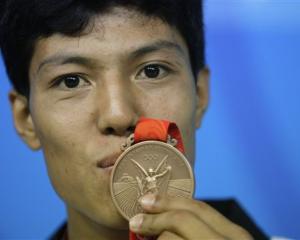On Olympic opening night the glossy, polished streets of Beijing are swarming with proud residents, pushy photographers, and a million officials who do not quite know what to do with themselves.
Evenings in the city have begun to thrill with excitement and quiver with anticipation.
People gather to talk, eat and watch the gigantic screens projecting the last days of the torch relay, which are set up in parks, shopping centres and busy thoroughfares.
Among the throng, more than 300,000 security personal are keeping watch, and flashing police cars roam the streets in convoys, though what they are looking for is hard to tell.
As the days have dwindled towards the longed-for opening there is hope - and optimism - on the streets that these Olympics will be the success the Chinese leadership, and the people, dearly want them to be.
Leading up to the opening, predictions of gloom and mishap were widespread.
For a while it seemed China could do no right, and every day the media would report another shortcoming: pollution levels unfit for athletes, incompetent taxi drivers who do not speak English, structural issues with the Birds Nest, problems with the water, and of course the usual medley of media censorship, exploitation of workers, Tibet, Darfur and Burma.
In a country of one billion people, trouble is never hard to find.
The tides turned somewhat in May when an earthquake measuring 8.0 on the Richter scale struck Sichuan province in Western China, killing more than 70,000 people.
The Government's response was swift and efficient, and praised widely by humanitarian groups, especially in contrast to the junta's lethargic and inept handling of Cyclone Nargis' destruction in Burma. The communist country has spent $US40 billion ($NZ57.8 billion) on the games, the most that has ever been spent on them.
Across Beijing their efforts gleam for all to see; the newly extended airport (now the biggest in the world) and subway system have gone into action. Chinese residents are also in on the effort.
Authorities have requested people to stop spitting, to line up in an orderly fashion, and to avoid asking foreigners personal questions about their age, love life and salaries.
It is advisable to not wear more than three colours at once, and to not tuck your T-shirt up to reveal your tummy as some Chinese men do to stay cool.
The Beijing Catering Trade Association has ordered all 112 designated Olympic restaurants to take dog meat off the menu, as it is feared this custom may offend Westerners.
Many Beijing residents seem happy to comply - especially the younger generation - and are appreciative that their government is attempting to "civilise" them, as one young woman said to me in Tiananmen Square.
But for their efforts, their "development", they want praise where it is due, and are angry that foreigners only want to write of "bad things" in China.
Other countries are jealous, this young woman told me.
Jealous of China's progress and success.
The hazy, polluted skies of Beijing - one of the chief criticisms of China hosting the Olympics - have steadily begun to clear this week, and a top WHO official (World Health Organisation) said he has been "extremely dissatisfied" with the media for exaggerating the current state of pollution, and that grey skies are not an accurate representation of the severity of the pollution.
In Beijing more than 70,000 volunteers are at work, and you cannot walk down the street without offers of help beating down from all sides.
Policemen and women and volunteers watch to see that you are finding your way all right, crossing the road safely, and using chopsticks that are clean.
Last night, in Ditan Park, in the centre of the city, a thousand people squeezed together on the ground with picnic rugs and bites to eat, to sit through nearly four hours of the Opening ceremony, never seeming to tire for a moment.
The Chinese people clapped and cheered for the most unexpected countries; Turkmenistan, Pakistan, Iraq, Germany, France and the United States - though when George Bush flickered on to the screen the crowd mainly booed.
Walking home just minutes before the night's thrilling end, fireworks burst into the sky, and people poured out of restaurants and homes - startled babies blinking at the glowing spectacle.
Chefs still rolling dumplings jumped up and down as police and military men tried in vain to keep the crowds from claiming the roads - but it was impossible.
"China! China!" they shouted together.
- Eleanor Ainge Roy is a freelance journalist and studies history and politics at the University of Otago.



